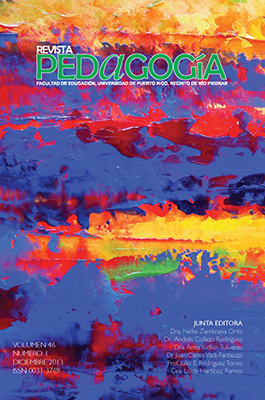Abstract
This paper presents some reflections about the journal Pedagogía on the occasion of its 60th anniversary. These considerations are constructed within a cultural-historical framework. From this perspective Pedagogía is a product of human activity that is historically situated, culturally mediated and socially constructed. First, the article discusses some ideas about the sociohistorical significance and projection of the journal. Then, it examines its value as a cultural tool in the production and sharing of knowledge on education and its importance for the formation of learning and practice communities. Lastly, the author presents a general conclusion about the legacy of the journal and shares an idea for its future development.
How to cite:
Rodríguez-Arocho, W. C. (2013). La revista Pedagogía como herramienta cultural: Reflexiones sobre su legado a la educación en Puerto Rico. Pedagogía, 46(1), 9-18. Retrieved https://revistas.upr.edu/index.php/educacion/article/view/16413
References
Daniels, H. (2003). Vygotsky y la pedagogía. Buenos Aires, Argentina: Paidós.
Kozulin, A. (2000). Instrumentos psicológicos: La educación desde la perspectiva sociocultural. Barcelona: Paidós.
Kozulin, A., Gindis, B., Agueyev V.S. & Miller, S. M. (Eds.). (2003). Vygotsky‘s educational theory in cultural context. New York: Cambridge University Press.
Lake, R. (2012). Vygotsky on education. New York: Peter Lang Primer.
Lee, C. & Smagorinsky, P. (Eds.). (2000). Vygotskian perspectives on literacy research: Constructing meaning through collaborative inquiry. Cambridge & New York: Cambridge University Press.
Moll, L. (1990). (Ed.). Vygotsky and education: Instructional implications and applications of sociohistorical psychology. Cambridge, MA: Cambridge University Press.
Moll, L.C. (2013). L.S. Vygotsky and education. New York: Routledge.
Moll, L. C., Soto-Santiago, S. & Schwartz, L. (2012). Funds of knowledge in changing communities. En K.Hall, T. Cremin, B. Comber & L. Moll (Eds.), International handbook of research on children‘s literacy, learning and culture. New York: John Wiley & Sons.
Portes, P. (2005). Dismantling educational inequality: A cultural-historical approach to closing the achievement gap. New York, NY: Peter Lang.
Quintero Alfaro, A. (1972/2007). Educación y cambio social en Puerto Rico. San Juan: Editorial de la Universidad de Puerto Rico.
Rodríguez Arocho, W. C. (1992). Implicaciones ideológicas de las prácticas educativas. Pedagogía, 27, 35-41.
Rodríguez Arocho, W. C. (1994). Los hallazgos de la investigación cognoscitiva en Puerto Rico: Retos a la psicología y a la educación. Pedagogía, 29, 17-41.
Rodríguez Arocho, W. C. (1998). La perspectiva constructivista en la educación. Pedagogía, 32, 6-20.
Rodríguez Arocho, W. C. (2002). Herramientas culturales y transformaciones mentales: De los jeroglíficos a la Internet. Ciencias de la Conducta, 17, 12-19.
Rodríguez Arocho, W. C. (2006). El constructivismo: Una invitación al análisis de sus antecedentes, vertientes y críticas. Pedagogía, 39, 12-28.
Rodríguez Arocho, W. C. (2008). La investigación educativa en América Latina: Cuatro desafíos y algunas ideas para enfrentarlos. Pedagogía, 41, 11-24.
Rodríguez Arocho, W. C. (2010a). El concepto de calidad educativa: Una mirada crítica desde el enfoque históricocultural. Actualidades Investigativas en Educación, 10(1). Recuperado de http://revista.inie.ucr.ac.cr/articulos/1-2010/archivos/calidad.pdf
Rodríguez Arocho, W. C. (2010b). Psicología de la liberación y pedagogía crítica: Un examen de sus aportes y retos. Pedagogía, 43(1), 13-34.
Rodríguez Arocho, W. C. (2012). La formación docente: Su resignificación desde el enfoque históricocultural. Pedagogía, 45, 95-126.
Rodríguez Arocho, W. C. & Alom Alemán, A. (2009). El enfoque históricocultural en el diseño y construcción de una comunidad de aprendizaje. Actualidades Investigativas en Educación, 9, 1-21. Recuperado de http://revista.inie.ucr.ac.cr/articulos/esp-2009/archivos/comunidad.pdf
Rodríguez Arocho, W. C., Hernández Caamaño, M. & González Pons, A. (2000). Indagación colaborativa del constructivismo: Una alternativa para fortalecer la agenda de transformación curricular en la República Dominicana Pedagogía, 34, 20-37.
Sánchez Cardona, I. & Rodríguez Arocho, W. C. (2011). Valorización de la teoría de aprendizaje situado y del concepto de comunidades de práctica desde el enfoque históricocultural. Pedagogía, 44(1), 113-132.
Vadi-Fantauzzi, J. C. (2012). Revista Pedagogía: 1953-2013, Resumen de sus 60 años como registro de las transformaciones de la realidad social y educativa en Puerto Rico. Pedagogía, 45, 13-28.
Vygotski, L. S. (1929/1998). La genialidad y otros textos inéditos. Buenos Aires, Argentina: Editorial Almagesto.
Wells, G. (1999). Dialogic inquiry: Toward a sociocultural practice and theory of education. Cambridge: Cambridge University Press.
Wells, G. (2000). Dialogic inquiry in education: Building on the legacy of Vygotsky. En C. D. Lee & P. Smagorinsky (Eds.), Vygotskian Perspectives on literacy research: Constructing meaning through collaborative inquiry (pp. 51-85). Cambridge: Cambridge University Press.
The contents published in the Puerto Rico Journal of Education is freely distributed under open access practices, in accordance with the Creative Commons license, Attribution-NonCommercial 4.0 International (CC BY-NC 4.0). Through these principles, the journal and its authors allow readers to access, reproduce and share articles in full text. Users should give credit to authors in a reasonable way without suggesting they have their support. Under no circumstances, readers may make use of the contents for commercial purposes. The authors retain copyright on their works.

